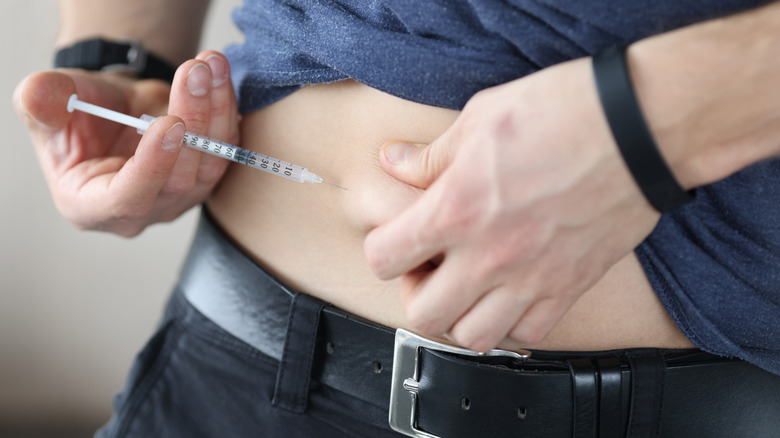Why You Should Avoid Alcohol If You Have Diabetes
If you have diabetes, you probably already know that everything you eat and drink affects your blood sugar levels. That includes drinks touted as healthy, whether they're fruit juices or alcohol, per Healthline. While a glass of wine or mug of beer at the end of the day might sound like a good idea, it's more complicated than that if your body has problems managing glucose levels.
With type 1 or 2 diabetes, your liver is responsible for storing excess glucose. When your blood sugar levels drop too low, the liver converts glycogen into glucose, which is then released into the bloodstream. Alcohol can interfere with this process in a couple of ways. Because alcohol is a toxin, your liver always will break it down first so it can quickly be eliminated (Everyday Health). When your liver has to stop and process alcohol, it can cause your glucose levels can drop, leading to hypoglycemia. In addition, certain types of alcohol can increase your blood sugar, resulting in hyperglycemia, per Verywell Health.
Alcohol can interfere with your medication
If you take insulin or other medicine that lowers your blood sugar, things get even more complicated. The hypoglycemia you get from drinking alcohol can linger for several hours after you've had a drink, so it can interfere with how your medication works, per Healthline. In addition, your liver metabolizes alcohol and your diabetes medication — if you mix the 2, you might end up giving your liver too much work to do, wellness dietician Amy Kimberlain told Everyday Health. That could also result in low blood sugar, and this risk increases if you drink without eating.
Most of the benefits linked to drinking alcohol are small. In fact, WebMD notes that for many, the advantages don't outweigh the risks involved, and abstaining is the best plan of action. The American Diabetes Association acknowledges that drinking alcohol is "individualized" and there are no hard rules when it comes to it. Discuss it with your doctor to weigh the pros and cons.


